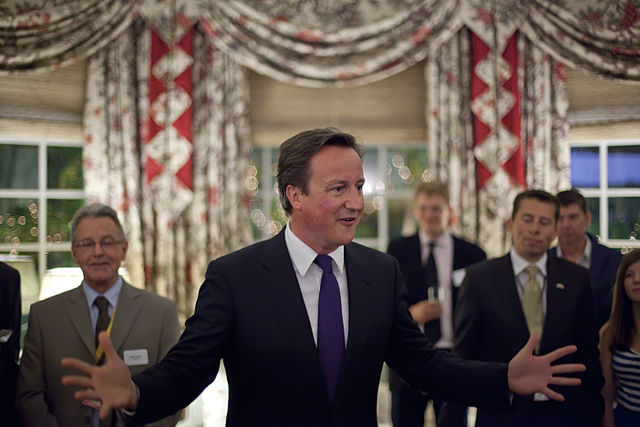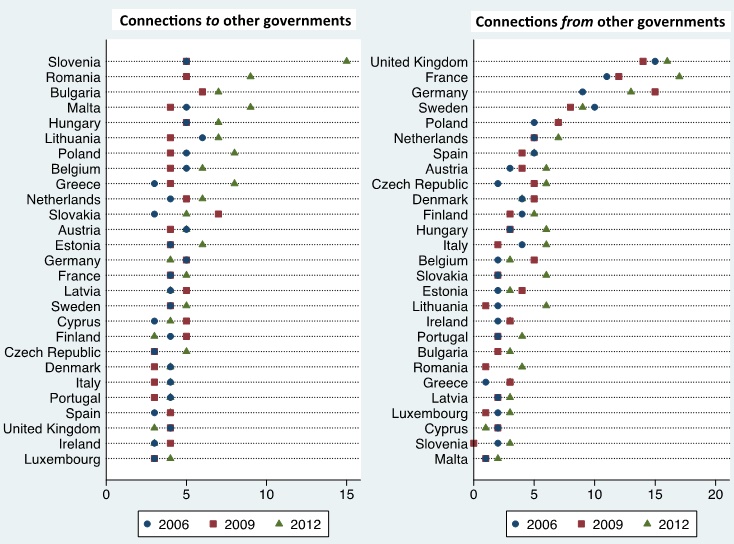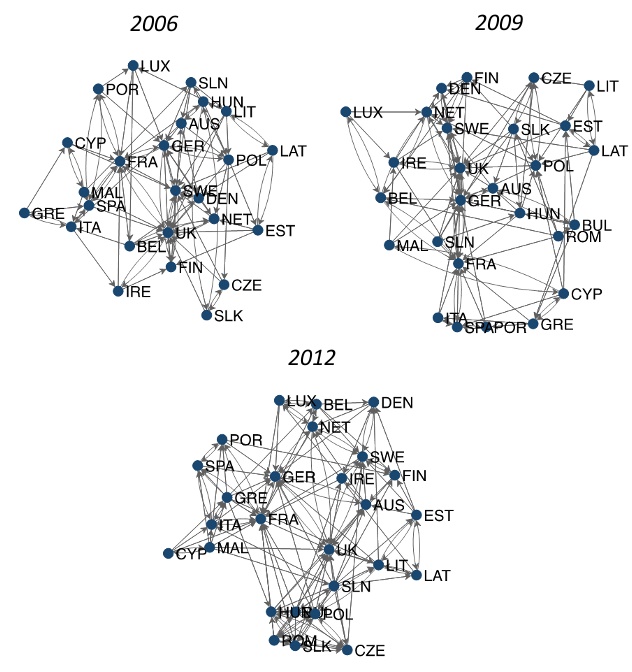The UK is, alongside other large states like Germany and France, at the heart of the EU policymaking process
How influential is the UK in EU decision-making? In the third in a series of articles, Simon Hix presents evidence on the countries EU member states choose to cooperate with during negotiations in the Council of the European Union. He writes that UK officials appear to be the best connected of all the member states’ officials, with more member states indicating that they choose to work with the UK than for any other country. Overall, the data suggest that the UK is at the heart of EU policy-making alongside larger states such as Germany and France.
This is the third in a series of articles on whether the UK is “marginalised” in the EU. Whereas the firstarticle looked at EU policy outcomes and the second looked at voting in the EU Council, this one looks “behind the scenes”: at connections between government officials in the EU’s committees and working groups. Are UK civil servants at the centre of EU bargaining – at the “top table” – or are they on the periphery?
The data for this analysis come from 869 interviews by Daniel Naurin, at the University of Gothenburg, and his research team between 2006 and 2012. Daniel and his researchers asked a simple question to each member state’s official in the same 11 committees and working groups in the EU Council: “Which member states do you most often co-operate with in order to develop a common position?”. The answers reveal which governments tend to work together in EU negotiations, and as a result which governments are better connected than others. Also, as the research was conducted in 2006, 2009 and 2012, it is possible to look at whether there have been any major changes since the Eurozone crisis and the growing Brexit debate.
To start with, Figure 1 shows the two sides of the connections: (1) how many other governments each government said that they worked with (were connected to) on average in each year; and (2) how many other governments mentioned a particular government (were connected from). Put together, these two measures give an indication of how much influence an EU member state’s officials have in EU negotiations.
Figure 1: Connections in EU Council negotiations
Note: The chart on the left indicates how many governments each state said they worked with (so Slovenia worked with the most and Luxembourg the least). The chart on the right indicates which states were most often cited by other states (so the UK was the most common country for states to say they worked with, while Malta was the least cited state).
UK officials on average mentioned four other governments they co-operated with: France, Ireland, the Netherlands and Sweden in 2006; Germany, France, Ireland and Sweden in 2009; and Germany, the Netherlands and Sweden in 2012. As the figure on the left shows, the officials of most other member states mentioned a higher number of other governments with which they co-operate. This might reflect the fact that the UK officials feel confident that they can achieve their aims without needing the support of many others. For example, the officials from the other large member states (Germany, France, Italy and Spain), with the exception of Poland, also mentioned only a small number of other governments, whereas the officials of many of the smaller member states named a higher number.
The centrality of the UK, along with the other large member states, is clearly revealed in the number of officials from other EU governments who mentioned the UK (in the figure on the right). Measured this way round, the UK’s officials are the most well connected of all the governments. In fact, the officials of only 6 other governments (out of 26 others) did not mention the UK as the main government they co-operated with in their working group in either 2006, 2009 or 2012: Greece, Italy, Luxembourg, Portugal, Cyprus, and Romania.
Not surprisingly, France and Germany, as the other two most powerful member states, were the second and third most mentioned by officials from other governments. Interestingly, though, amongst some of the smaller member states, several of the UK’s traditional allies (Sweden, the Netherlands, and Denmark) are also central players in EU negotiations.
Figure 2: Changes in connections over time (click to enlarge)
Note: Bulgaria and Romania joined the EU in 2007.
Figure 2 shows the breakdowns for 2006, 2009 and 2012 separately. The UK’s position has been stable across this period, both in terms of connections from other governments to the UK (on the right) as well as UK connections to other governments (on the left). If anything, the number of governments connecting to UK officials increased between 2006 and 2012. Overall, the main change between 2006 and 2012 has been the increase in the number of connections made by officials from some of the newer member states (such as Slovenia, Romania, Malta and Poland) to governments from the other member states. In short, not much has changed (yet) in day-to-day EU negotiations since the Eurozone crisis.
Finally, whereas these numbers reveal how many connections each government has, they do not show which groups of governments work together. To illustrate this, Figure 3 shows the network of connections in 2006, 2009 and 2012. In these figures, the arrows show the direction of a connection from one government to another, and the positions of the governments are determined by how many connections each government has as well as who they are connected to: with the more connected governments closer to the centre, and governments with similar connection patterns located closer together.
Figure 3: EU negotiation networks
Note: Bulgaria and Romania joined the EU in 2007.
These network pictures clearly show the centrality of the UK in EU negotiations. Germany and France are also close to the centre, but UK officials appear to be the best connected of all the member states’ officials.
In other words, when it comes to negotiations behind the scenes, before votes take place and before laws are adopted, the data suggest that the UK government is right at the heart of EU policy-making, and certainly at the top table, alongside Germany and France. The data also suggest that the Eurozone crisis has not had any noticeable effect on the centrality of the UK in EU bargaining.
As ever, though, there are some caveats. I have only focused on the “first” other member state each official mentioned (although looking at the second, third and fourth mentioned member states does not affect the conclusions). I have also not looked into connections in particular policy areas, and the UK clearly cares about some policy areas more than others. And, for a full picture of the UK’s position in EU politics, these findings need to be considered alongside other results.
—-
Note: This article also appears at The Guardian, UK in a Changing Europe, and the LSE’s Brexit and Europp blogs. It gives the views of the author, and not the position of EUROPP – European Politics and Policy, nor of the London School of Economics.
—-
 Simon Hix is Harold Laski Professor of Political Science at the London School of Economics and Political Science and Senior Fellow on the ESRC’s UK in a Changing Europe programme.
Simon Hix is Harold Laski Professor of Political Science at the London School of Economics and Political Science and Senior Fellow on the ESRC’s UK in a Changing Europe programme.









 Democratic Audit's core funding is provided by the Joseph Rowntree Charitable Trust. Additional funding is provided by the London School of Economics.
Democratic Audit's core funding is provided by the Joseph Rowntree Charitable Trust. Additional funding is provided by the London School of Economics.
The UK is, alongside other states like Germany and France, at heart of #EU policymaking process, writes @simonjhix https://t.co/QsWeKW5y8Y
Alongside other large states like Germany and France, the UK is at the heart of the EU policymaking process https://t.co/RY1i9sBj6U
Surprising & unintuitive: @simonjhix research shows UK is most influential member state on EU policy making #EUref: https://t.co/47v5nmi5eq
The UK is, alongside other large states like Germany and France, at the heart of the EU policymaking process https://t.co/br7CfPzGrK
The UK is, alongside other large states like Germany and France, at the heart of the EU… https://t.co/i0iPxVZx25 https://t.co/TDgbTiSFzv